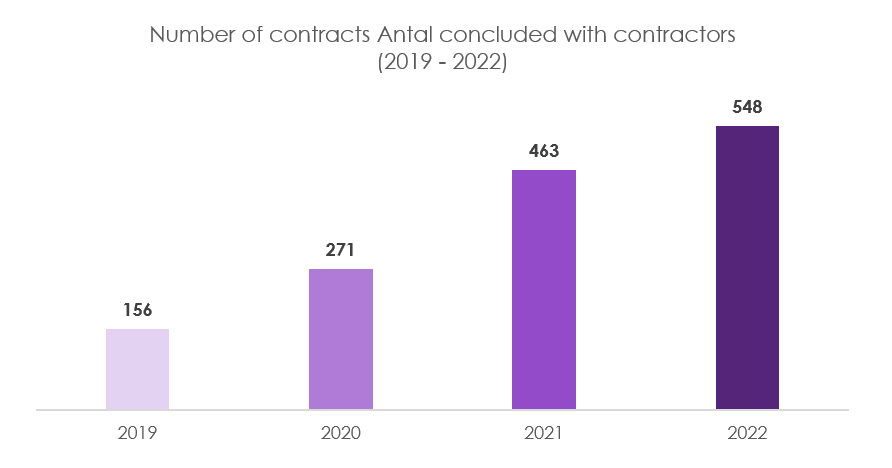IT contracting – the future of the technological labor market
The percentage of people employed on temporary contracts, also based on contracting, is growing - according to research by the European Commission. This is also confirmed by the increasing number of contractors employed by Antal over the last five years.

What is the difference between contracting and outsourcing?
Contracting and outsourcing are closely related concepts, they are not the same. The main differences can be noticed in matters related to the scope of responsibility, the form of the contract and the nature of the relationship.
- Outsourcing is a business strategy that involves transferring specific functions, processes or services related to a company's operations to an external supplier. A company decides to outsource to focus on key areas of its operations, gain access to specialized knowledge or skills, reduce costs or increase operational efficiency. In outsourcing, the client's company delegates control over certain functions or processes to an external supplier, who is responsible for providing them to the client in accordance with the agreed terms of the contract.
- Contracting is a business model in which a company hires specific skills or resources from an independent contractor (often a specialist or company) for a specified period of time to perform a specific project or task. In contracting, the client's company defines the scope of the project or task as well as the expected goals and deadlines, and the contractor undertakes to implement them in accordance with the agreed terms of the contract. The key difference between outsourcing and contracting is that in this form of cooperation, the client company retains greater control over the project or task because the contractor operating on a contract basis is often treated as an independent contractor rather than an external service provider.
When is it worth using IT contracting
Working with a contractor can be beneficial for many reasons and for various types of businesses. The most common situations when it is worth using the contracting service include:
- Need for specialized skills – usually when there is a temporary project or task to be completed that requires specialized skills. We most often encounter this situation in the context of IT projects, but other industries are also increasingly choosing this form of cooperation.
- Sudden need for a replacement - in a situation where a permanent employee must go on maternity leave or extended sick leave, it will be more beneficial to hire a contractor than a new full-time employee, especially if your company does not need permanent full-time staff or if there are budget constraints.
- Seasonal or periodic increase in demand - hiring a contractor allows for a flexible approach to the availability of human resources depending on changing business needs. You can easily adjust the number of contractors to the current requirements of the project or company activity.










